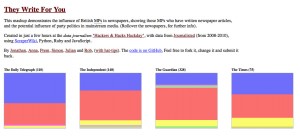Having set-up a discussion group online and run two successful offline meet-ups, Adam Westbrook’s Future of News initiative has inspired new events in the West Midlands, Brighton and Scotland. The idea: to discuss new tools, new directions and share ideas for the future of UK journalism.
West Midlands
The first ever meeting of the West Midlands branch of the Future of News group will be held at Birmingham City University on Monday 8 February at 6.45pm. To register you’ll need to sign up here. All is explained in a post on the site Journal Local and there’s a short introductory video from organiser Philip John:
Brighton
On the same date Journalism.co.uk’s own Judith Townend has set-up the first meeting of the Brighton group – with scheduled talks from the Brighton Argus’ web editor Jo Wadsworth and the Guardian’s Simon Willison. It’s at The Skiff from 7.15pm – and you can sign up here.
Scotland
Both of which have got digital editor Iain Hepburn wondering what demand there is for a similar meet-up in Scotland. If enough people register an interest, he says he’s happy to get the ball rolling. If you are, let Iain know on this blog post.



![Reblog this post [with Zemanta]](https://img.zemanta.com/reblog_e.png?x-id=b20979e1-8191-4d6f-91e0-8c61b21d72d5)
![Reblog this post [with Zemanta]](https://img.zemanta.com/reblog_e.png?x-id=05efd4ab-9e17-45b2-92cc-ca98ba2a7f94)
![Reblog this post [with Zemanta]](https://img.zemanta.com/reblog_e.png?x-id=6480380e-783d-4bb9-ab51-1513c0dc7453)